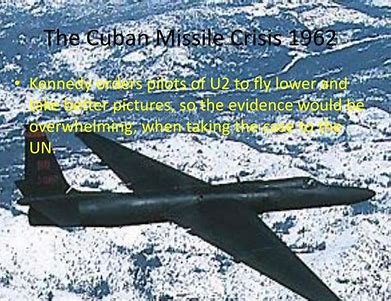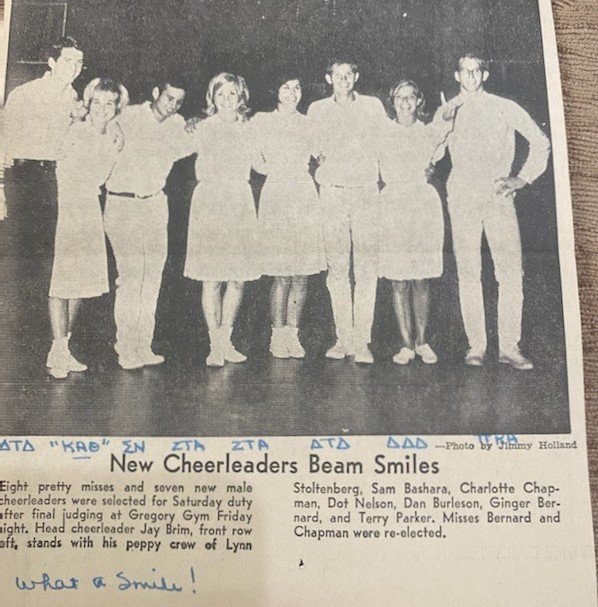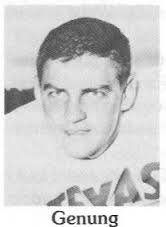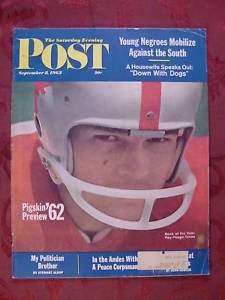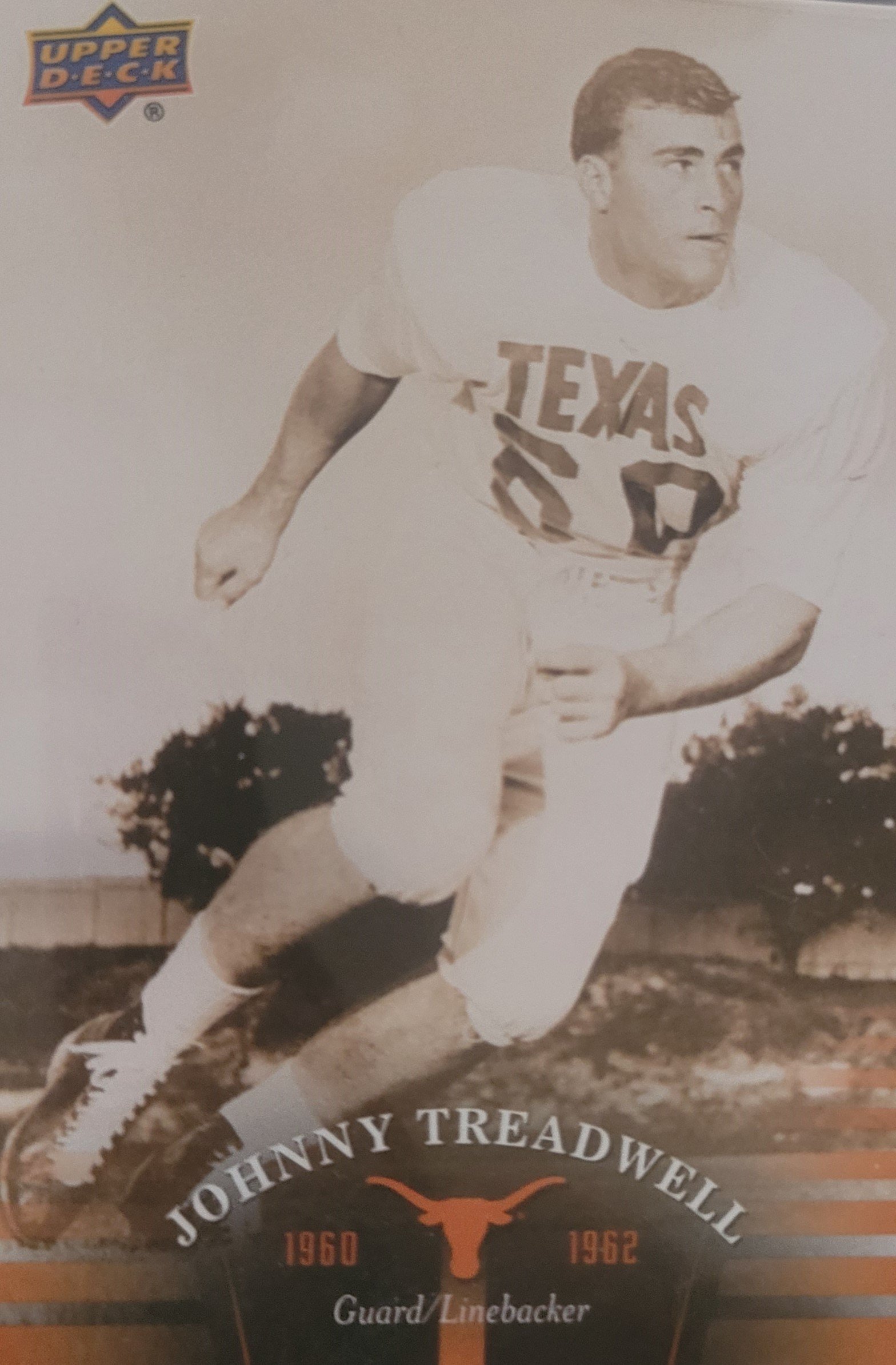Professor Larry Carlson's published articles are archived on the TLSN website. To learn more about Larry visit the link LARRY CARLSON'S BIO AND ORAL HISTORY (squarespace.com)
FLASHBACK to 1962:
Horns, Hogs, and The Cuban Missile Crisis
by Larry Carlson ( lc13@txstate.edu )
Tension prevailed all week in mid-October 1962 as top-ranked Texas prepared to host seventh-ranked Arkansas. For the fourth straight season, it appeared that this burgeoning rivalry between the teams coached by best buddies, Darrell Royal and Frank Broyles, would decide the Southwest Conference championship, perhaps even a national title.
Broyles and DKR
This October the high anxiety level involved more than football. Much more. Yes, Texas had edged OU at the Cotton Bowl, 9-6, to tighten its grip on the number one ranking But the following day, Sunday, Oct. 14, a U-2 spy plane over Cuba spotted nuclear missile sites under construction. Florida was just ninety miles away,
The American U2 Spy plane
Americans were shaken by the foreboding news from Fidel Castro's communist regime under the red wing of the USSR. President Kennedy huddled with a tight team of military and political advisers regarding what would quickly come to be known as The Cuban Missile Crisis.
This writer, then a nine-year-old fourth-grader in San Antonio, lived and breathed Longhorn football. Beating Arkansas was foremost on my mind. But I can readily recall being nervous about the fact that my parents were suddenly stockpiling large jugs of water. Our elderly neighbors, Daisy and Ted, already had a bomb shelter dug into their backyard. I was pretty sure there would be no room in it for the Carlsons, and that caused me a bit of a nervous stomach.
Local newscasters were speculating about the Cold War becoming hot, some saying the Alamo City would be one of the communists' top five targets in America. My hometown, sometimes also called "Military City," was home to three Air Force bases plus Fort Sam Houston.
The sports pages, though, were still dominated by coverage of Longhorn football, and Daddy had told Mom, my two sisters, and I that we would drive to Austin on Saturday and try to get tickets for the big game. Calmed by my parents, I tried not to worry too much that week, except about those danged Razorbacks.
When Saturday evening came, our family's members were sweating it out, literally, in hot, unseasonably humid weather outside Memorial Stadium. The last few hundred remaining tickets were to go on sale at the ticket booth at 6 pm, ninety minutes before kickoff. Wedged in for two hours with at least a thousand other hopefuls, most of them taller than I, was no fun. I actually almost swooned from lack of air but some good folks noticed and cleared a little space for my family and me. True story.
The wait was rewarded when our party of five got some of the last remaining end zone/Knothole Section tickets. The stadium's capacity of 64,350 was sold out. And we were in.
What followed was somewhat the typical early '60s defensive slugfest. The "Showband of the Southwest" boomed "Texas Fight" a zillion times and the cheerleaders led the crowd with "Go, Horns, Go" chants that reverberated throughout the gray stadium. But the going was tough. Arkansas managed a field goal in the second period and clutched a 3-0 lead at halftime. Public address announcer Wally Pryor, provided the day's final scores, including that of ol' Slippery Rock State (Pa.) College and, tongue in cheek, announced that an overnight home for the Arkansas band had been located...at the Austin Salvation Army.
Coach Royal replaced QB Duke Carlisle in the second half with sometimes-starter Johnny Genung. He was able to hit a couple of short passes, but the Hogs were still slamming the door on UT's bread and butter, the famed "three yards and a cloud of dust" ground game. Ray Poage, the Horns' big senior fullback, crunched out 51 yards on 18 carries.
In the final quarter, still ahead by three, Arkansas drove for what would essentially be a game-clinching touchdown, earning a first-and-goal at the five. It was reported later that the dire situation prompted Johnny Treadwell, an All-America guard/linebacker and scholastic star, to pipe up with urgency and reassurance for the huddled Texas defenders, backs to the wall. Known for his intensity, the man nicknamed "Chopper," told his teammates this: "Alright, we've got 'em right where we want 'em. They've run out of room. They can't pass. They've gotta come right at us."
The Longhorn football team's most decorated student (a two-time academic All-American) was correct. Two plays later, Treadwell, who with jersey number 60 would set the smashmouth pace for Tommy Nobis and other stellar linebackers, teamed with feisty 180-pound Pat Culpepper to smash Razorback FB Danny Brabham as he attempted to dive over the pile for a TD.
The picture of that jarring collision and the resulting fumble squirting out is one of the top ten photo images in Longhorn football history.
John Treadwell
Texas had the ball and new life. But the Steers fumbled the pigskin right back and had to jam Arkansas on a fourth-and-one in the red zone. With eight minutes remaining, Carlisle returned briefly at quarterback, but Royal knew he was gassed, having played all the way on defense and logging 44 minutes.
Genung was sent back into the huddle. The Horns had recorded just one first down in the second half and 114 yards total offense all night. Failure now, and Texas might not get the ball back. In '62, there were no hurry-up offenses.
From their own 15-yard line, the Longhorns -- this season wearing burnt orange for the first time since World War II -- began chipping away. Smokey the cannon was fired after Texas made a first down. Then again, after another first down was eked out. Mixed with cow bells, the roar from UT fans seemed to shake the stadium between plays.
Genung hit Charlie Talbert for eleven yards on a do-or-die fourth-and-four, then loosened the Hogs' defense with a nine-yard strike to Talbert. The cannon had sounded now six times and Texas was inside the ten. The clock had ticked down to under two minutes on the scoreboard in the south end, where the Longhorn herd was headed. It was on third and goal from the three when Texas cashed in. Junior tailback Tommy "Thunderbird" Ford took a pitchout and crashed across the goal, dragging a desperate Razorback.The capacity crowd, drunk on euphoria and not an inconsiderate amount of bourbon from stealthy flasks, celebrated like never before.
"We're number one," we Texas fans thundered, the first lead of the sweltering night in hand.
I have always remembered that a mere 36 seconds were left on the clock.
In 2022, many teams work near-miracles in fewer than 36 seconds. Texas completed three passes in under 20 seconds, then kicked a field goal, to tie Texas Tech at the gun in September. But sixty years earlier, grainy highlight reels were not filled with last minute heroics. The Hail Mary was reserved for the Catholic church.
In 1962, Arkansas was cooked, its Hogs roasted and done. Texas 7, Arkansas 3.
The Longhorns were still number one. For another week, anyway.
Meanwhile, the Cuban Missile Crisis intensified. A nation was on alert, dealing with confrontation and escalation toward an unthinkable Armageddon.
The Longhorns took the short jaunt to Space City to face the Rice Owls the following week. It was barely a month after JFK had delivered his "We Choose To Go To The Moon" speech at Rice Stadium. The President had spoken of tall challenges to be accepted by the bold.
One of the rhetorical questions mentioned by Kennedy was "Why does Rice play Texas?"
Not because it's easy, he said, but because it's hard.
Top-ranked Texas was a heavy favorite over the disappointing 0-3-1 Owls, a team that had played in the Sugar Bowl and Bluebonnet Bowl the previous two years. Little did fans of the Blue and Gray know, but it would be 45 years until another bowl game would be reached.
But on Saturday night, October 27th, before a sellout crowd of 73,000 at Rice Stadium, the Owls fought Texas to a stunning 14-14 deadlock. It would drop UT to a number five ranking.
See the link below for more about the Rice, Texas game of 1962.
RICE, TEXAS, AND JFK 🏈 (squarespace.com)
The day after the football tie that rocked college football, Soviet Premier Nikita Khrushchev announced a decision to remove missiles from Cuba. In return, JFK committed to a promise that the U.S. would never invade Cuba.
The news brought relief to the Western world. Still, there would be no real thaw in "The Cold War." But uneasy Americans would slowly, determinedly resume a routine that did not include constant thoughts of bomb alerts and fallout shelters.
Fans of the Texas Longhorns would enjoy a 9-0-1 regular season, the first unbeaten one in modern times. Juniors such as Duke Carlisle, Tommy Ford and stalwart tackle Scott Appleton would look forward to even greater accomplishments. A national championship was only one year up the road.
Talk of nuclear Armageddon could be put on hold, at least for six more decades.
End of Larry Carlson’s article for TLSN
Why the 1962 Arkansas game was so Special by Pat Culpepper
Pat Culpepper
Why is that game so special to people in Texas?
They had thrown the ball to get down there, and they ran their fullback, and our defensive line got under [current Dallas Cowboys owner] Jerry Jones and their group up front, and we hit Danny Brabham at the same time and the ball rolled right over our shoulders. And that young man, Danny Brabham, got death threats for the next two weeks. That affected him the rest of his life. That's how big [the game was], and it wasn't on television. It was on radio and the 64,000 people that were there and that was it. But that picture was captured by Al Panzera of the Fort Worth Press, who got down in the end zone expecting a touchdown and caught that picture. I sign - usually once a month - photographs of that reproduction.
Maybe they remember it more because they heard it on the radio. It's incredible how many people remember that game. It was a great game, because we were No. 1, and we had been No.1 since the season started. And Arkansas came in at No. 7, but two teams had lost that afternoon. It was a night game and they had moved up in the rankings, and it was quite the football game. We scored with thirty-six seconds [remaining] to win, and we go to the dressing room, and Coach Royal said the people aren't leaving unless we go back out on the field. We got back on the field, and then we went back to the dressing room, and Lyndon Johnson - Vice President Johnson - was on the phone calling Coach Royal. It was quite a momentous occasion, and I don't think anybody went to sleep that night. The horns were honking on campus. You couldn't go to sleep. Everybody was up yelling and going on in the streets. It was just that kind of game because we won on a 20-play, 85-yard drive, with three fourth-down conversions. So it was just one of those deals.
What does the game of football mean to you?
It's the epitome of competition. I wasn't a big guy, and I had to make up a lot of ground. In my coaching career I tried to put that in players - that size doesn't matter, it's what's in your heart. If you really want to win, and if you really want to work, you have got a chance. I think that generation that I came through, epitomized that. So the coaching part was fun and the playing was tough, but it had its rewards along the way.



